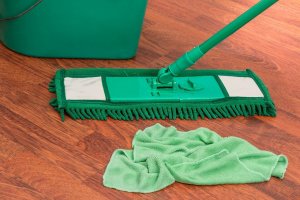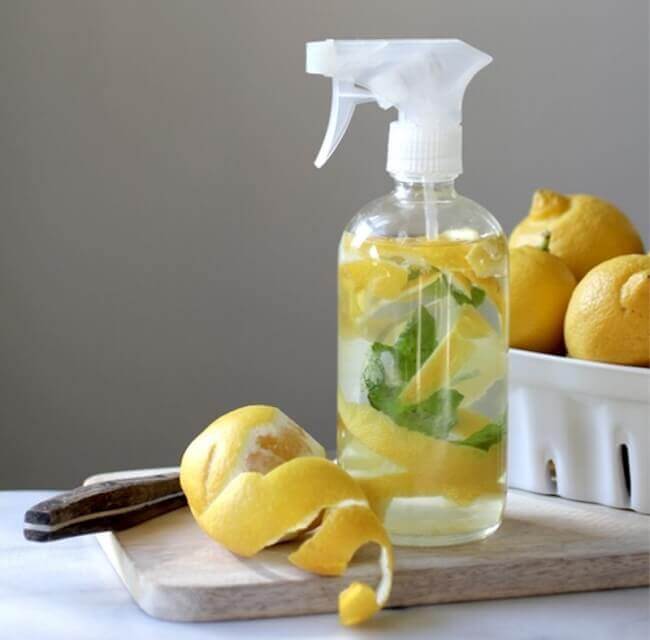Try This Natural Citrus Floor Cleaner

Making a citrus floor cleaner has multiple advantages for disinfecting and removing marks. Due to the interesting combination of ingredients, it has anti-bacterial and whitening properties that leave floors in pristine condition.
Its principal advantage over commercial cleaners is that it doesn’t contain aggressive chemical additives. Because of this, using it doesn’t affect the environment or produce allergic reactions in sensitive people.
So how can you make your very own floor cleaner at home?
Actually, no special ingredients are necessary to make it. In fact, the majority of them tend to be in the kitchen cupboard.
In this article we want to share in detail its uses and an easy recipe to prepare your own citrus floor cleaner in a few simple steps.
The Benefits of a Natural Citrus Floor Cleaner

Citrus has been used to make cleaning products for the home since ancient times. Due to its high concentration of antibacterial oils and whitening agents, it has been a main ingredient in soaps, detergents and air fresheners.
However, citrus cleaner, in its natural state, continues to prevail as a cleaner for many household tasks. Because of its ecological characteristics, it can even replace commercial cleaners.
Continuing on, we would like to teach you how to prepare a citrus floor cleaner.
This is a 100% natural solution that is a concentration of lemon rind, oranges, pomegranate and other ingredients. These ingredients aid in disinfecting these types of surfaces.
What are the advantages?
This natural cleaner:
- Helps remove marks and stains.
- Eliminates dirt that comes into the home on shoes.
- Disinfects floors, eliminating virus and bacteria that tend to proliferate on the surface.
- Cleans the grout in tiles.
- Neutralizes unpleasant odors and leaves a delicious citric aroma.
- Gets rid of the sensation of a greasy kitchen floor.
- Eliminates dust and dust mites, decreasing the risk of allergies.
- Does not give off aggressive chemical particles that are harmful to respiratory health.
- Is cheap and easy to make!
Also read: The Best Natural Products to Clean Your House
How to Make This Citrus Floor Cleaner

Making this floor cleaner is very simple and doesn’t take much time. Besides, it’s a great way to take maximum advantage of those fruit peelings that we consider garbage. Although we tend to dismiss them, they contain oils and important compounds for cleaning.
Are you ready to try it?
Ingredients
- Citrus fruit rinds (mandarin, orange, and lemon)
- 4 grains of black pepper
- 1 stick of cinnamon
- Apple peel
- 2 cloves
- 2 cups of white vinegar
- Water (necessary amount)
Utensils
- Pan
- Wooden spoon
- Colander
- Bottle with atomizer
Directions
- First, fill a pot with water and add the rinds. If desired, cut the rinds ahead of time for a more concentrated aroma.
- Heat to boil on low heat and leave it on the heat until half of the water evaporates.
- Then, turn off and add the pepper, cinnamon, the apple peels and the cloves.
- Cover and allow to steep until just lukewarm.
- Later, strain all in a colander and transfer to a larger container.
- Add the vinegar and stir with a wooden spoon.
- Pour into a bottle with an atomizer for ease of use.
- If desired, label to identify, so as not to confuse with other items.
- Store in a cool dark place for a month.
How to use
- Sprinkle a generous quantity of the cleaner over the floor.
- Allow to work for a couple of minutes and then rub with a rag.
- If the floor has difficult marks, allow to sit for 10 minutes and then scrape off with a nice.
Interesting article: 7 Tips to Clean Difficult Surfaces
Note: You can use this cleaner on the surfaces in the kitchen and bathroom. Since it has properties that remove grease and bacteria, it facilitates cleaning chores in these places.
Are you ready to make this citrus cleaner for the floor? Even if you don’t replace your commercial cleaners with ecological cleaners, it’s a great option to start. As you’ve just seen, it’s very easy to prepare and has many disinfectant benefits.
In addition, due to the pleasant aroma, it’s perfect to say goodbye to annoying odors that block off certain areas of the house. Don’t miss trying it!
All cited sources were thoroughly reviewed by our team to ensure their quality, reliability, currency, and validity. The bibliography of this article was considered reliable and of academic or scientific accuracy.
-
Zota, A. R., Singla, V., Adamkiewicz, G., Mitro, S. D., & Dodson, R. E. (2017). Reducing chemical exposures at home: Opportunities for action. Journal of Epidemiology and Community Health. https://doi.org/10.1136/jech-2016-208676
-
Jayaprakasha, G. K., Negi, P. S., Sikder, S., Mohanrao, L. J., & Sakariah, K. K. (2000). Antibacterial activity of citrus reticulata peel extracts. Zeitschrift Fur Naturforschung – Section C Journal of Biosciences. https://doi.org/10.1515/znc-2000-11-1230
-
Dhanavade, M., Jalkute, C., … J. G.-B. J. of, & 2011, U. (2011). Study antimicrobial activity of lemon (Citrus lemon L.) peel extract. British Journal of Pharmacology and Toxicology. https://doi.org/10.1002/ajp.21003
This text is provided for informational purposes only and does not replace consultation with a professional. If in doubt, consult your specialist.








